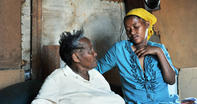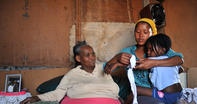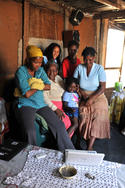Beauty Skefile shares what ensued after she and fellow Crossroads residents resolved to oppose the apartheid police’s removal of their shacks. The triumph that followed enabled Beauty to embrace her own power and perseverance.  ©Eric MillerOne day we all decided we were tired of being scared and we were going to stay. 'If they want to kill us, let them kill us,' we said. 'We cannot do otherwise. We are going to sit.'
©Eric MillerOne day we all decided we were tired of being scared and we were going to stay. 'If they want to kill us, let them kill us,' we said. 'We cannot do otherwise. We are going to sit.'
The next time the police came with their dogs, we were just sitting there. They asked, 'What is going on?'
We said, 'We like sitting here. We are not going away because there's no other place for us to stay.' They left us. Then we went to the Black Sash again to tell them. This time, the Black Sash said, 'Alright. That's good.' The police came again and again, and left us alone.
Sometimes they made us scared, coming close with their dogs as if they were going to put them on us again. But we were just grumbling and swearing at them, telling them we were not going anywhere, and they left. They didn't shoot us. They were not trying to kill us. They just wanted to scare us and chase us away. ©Eric MillerOne day the ANC (African National Congress) leader in the Crossroads area, Johnson Ngxobongwana, called us all to a meeting to make a plan about our problems. He said we must meet outside Uxolo school and protest to tell the police we are not going anywhere. So we all went, the kids and everyone.
©Eric MillerOne day the ANC (African National Congress) leader in the Crossroads area, Johnson Ngxobongwana, called us all to a meeting to make a plan about our problems. He said we must meet outside Uxolo school and protest to tell the police we are not going anywhere. So we all went, the kids and everyone.
Oh, that was a bad day! Yoh, yoh, yoh! There were about 500 of us. The police came again with their big vans, dogs and guns. We were singing 'Nkosi Sikelel' iAfrika' outside the school, about 500 of us. They told us through their loudhailers to leave. We said no.
Then, every one of them came running at us. They hit us with sjamboks and sticks. Oh, they hit us. Some babies were lying on the ground. If you had shoes you ran away and lost your shoes. The kids were maimed, some babies got hurt. Yoh, yoh, yoh! That day, it was a big day. Almost everyone was hurt.
I wasn't hurt. I ran away. I was still young and I did have legs. But not everybody got away. They took Ngxobongwana and put him in the van. They took him to the bush, and there they hit him, they hit him.
Then they brought him back and dropped him at the school. He was bleeding, he was hopeless, his ribs broken and his one arm broken too. He could do nothing when he came back, nothing. He was broken.
He had to go to the hospital and it took a long time, maybe three months. After that time he was better. He carried on being our leader. When the police came after that, we all just sat there, him too. ©Eric MillerOne of the days when we were refusing to go was just after my daughter had a baby, in 1978 or 1979.
©Eric MillerOne of the days when we were refusing to go was just after my daughter had a baby, in 1978 or 1979.
The policeman Mr Basson came again and he saw us sitting there on the hot sand in the sun with the baby. He said to me, 'Granny, why do you stay here? Why don't you just go home?'
And I said, 'Where can I go? There is no other home for me.'
He said, 'Where were you born?'
I said, 'I was born in Wynberg, and you people did chase us away from there.'
He said, 'You were born in Wynberg, in Cape Town?'
I said, 'Yes, and you people did chase us away.'
He never answered me. Then he went away. It was the last time he came. What I said was true.
I can't be sure why they didn't come again, but they left us and we put up our shacks and we stayed there.By Jo-Anne Smetherham
Police Defiance

The next time the police came with their dogs, we were just sitting there. They asked, 'What is going on?'
We said, 'We like sitting here. We are not going away because there's no other place for us to stay.' They left us. Then we went to the Black Sash again to tell them. This time, the Black Sash said, 'Alright. That's good.' The police came again and again, and left us alone.
Sometimes they made us scared, coming close with their dogs as if they were going to put them on us again. But we were just grumbling and swearing at them, telling them we were not going anywhere, and they left. They didn't shoot us. They were not trying to kill us. They just wanted to scare us and chase us away.
A Bad Day at Crossroads

Oh, that was a bad day! Yoh, yoh, yoh! There were about 500 of us. The police came again with their big vans, dogs and guns. We were singing 'Nkosi Sikelel' iAfrika' outside the school, about 500 of us. They told us through their loudhailers to leave. We said no.
Then, every one of them came running at us. They hit us with sjamboks and sticks. Oh, they hit us. Some babies were lying on the ground. If you had shoes you ran away and lost your shoes. The kids were maimed, some babies got hurt. Yoh, yoh, yoh! That day, it was a big day. Almost everyone was hurt.
I wasn't hurt. I ran away. I was still young and I did have legs. But not everybody got away. They took Ngxobongwana and put him in the van. They took him to the bush, and there they hit him, they hit him.
Then they brought him back and dropped him at the school. He was bleeding, he was hopeless, his ribs broken and his one arm broken too. He could do nothing when he came back, nothing. He was broken.
He had to go to the hospital and it took a long time, maybe three months. After that time he was better. He carried on being our leader. When the police came after that, we all just sat there, him too.
Refusing to Go

The policeman Mr Basson came again and he saw us sitting there on the hot sand in the sun with the baby. He said to me, 'Granny, why do you stay here? Why don't you just go home?'
And I said, 'Where can I go? There is no other home for me.'
He said, 'Where were you born?'
I said, 'I was born in Wynberg, and you people did chase us away from there.'
He said, 'You were born in Wynberg, in Cape Town?'
I said, 'Yes, and you people did chase us away.'
He never answered me. Then he went away. It was the last time he came. What I said was true.
I can't be sure why they didn't come again, but they left us and we put up our shacks and we stayed there.By Jo-Anne Smetherham